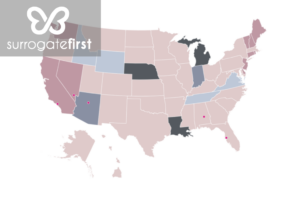The desire to have children and build a family is a beautiful aspiration. However, recent personhood legislation granting embryos legal rights has cast a shadow over the family-building journeys of countless intended parents across several states.
These laws, though aimed at restricting abortion access, have inadvertently created significant roadblocks and sources of stress for those hoping to conceive through IVF or surrogacy.

Delayed Plans for IVF
Nearly one in five intended parents (18%) have made the difficult decision to delay their plans for IVF treatment in light of the new rulings. With legal uncertainties surrounding the status and handling of embryos, many hoped-for fertility journeys have been put on indefinite hold.
“We’ve been trying for so long to have a child,” shares Amanda, an intended parent in Oklahoma. “Just when we were ready to move forward with IVF, this legislation came out of the blue. We had no choice but to pause everything out of fear of legal repercussions.”
Caution Around Surrogacy
The trepidation extends to those pursuing surrogacy as well, with 20% of intended parents either postponing or proceeding with extreme caution on this family-building path. The recent laws have muddied the legal waters around surrogacy arrangements, leaving intended parents struggling with tough choices.
However, despite these new legal hurdles, surrogates remain resolute in their commitment to helping intended parents realize their family-building dreams.
New Legal Hurdles
The survey data shows that a full 30% of intended parents have already encountered legal challenges or barriers in trying to access IVF or surrogacy due to the new legislation’s impacts.
From denied care at fertility clinics to complex informed consent processes and restrictions around embryo handling, the limitation has thrown up numerous logistical and financial obstacles. As Kate laments, “I never imagined this process could get so complicated from a legal standpoint. We’re just trying to have our own child.”
Financial Burden Increases
In addition to the logistical strains, the financial burden of pursuing family building has increased dramatically for half of the intended parents surveyed. The new restrictions and requirements have raised costs through legal fees, medical bills, travel expenses, and other hidden fees.
Many now face thousands of dollars in anticipated additional expenditures simply to navigate the new landscape. “It feels like we’re being penalized simply for wanting to be parents,” said Miguel. “These extra costs are becoming insurmountable.”
Heightened Mental Stress
Perhaps most concerningly, 67% of intended parents report heightened mental stress, anguish, and anxiety due to the implications of this legislation. The emotional toll of having one’s family dreams jeopardized cannot be overstated.
For Sarah, the struggles have become overwhelming at times: “Some days I can barely get out of bed from the fear and depression of potentially never becoming a mother because of these laws. It’s a mental anguish I wouldn’t wish on anyone.”
Conclusion
This recent legislation’s financial costs and mental health burdens should not be ignored or minimized. Intended parents deserve support and advocacy as they navigate this challenging new reality.
SurrogateFirst aims to provide guidance, resources, consultation, and services to help make family-building dreams become realities despite the obstacles. Because for those with a profound aspiration of parenthood, no legislative hurdle should violate that human essence.
Join us and sign this petition from Resolve to stand with the 1 in 6 people who face barriers to building a family.





